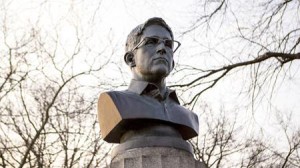 Whatever anyone thinks of former CIA network administrator, Edward Snowden, whether as a whistleblowing champ hero or a hacking chump coward, he raised the consciousness of citizens to the fact that they had very little privacy, that we all remain under constant warrantless NSA surveillance for no good reason while their secret big data haul makes the fictional Orwellian Big Brother a harsh reality.
Whatever anyone thinks of former CIA network administrator, Edward Snowden, whether as a whistleblowing champ hero or a hacking chump coward, he raised the consciousness of citizens to the fact that they had very little privacy, that we all remain under constant warrantless NSA surveillance for no good reason while their secret big data haul makes the fictional Orwellian Big Brother a harsh reality.
Many are willing to surrender freedom and privacy for seeming security.
Many say they don’t care if the government is hoovering up every bit of information about them – what do they have to hide?
For all the self-asserting bluster about their individual dignity and independence, many have chosen to escape from the hard-earned freedom defined by our bill of rights to embrace humiliating subjection.
A recent declassified report, authored in 2009, but released just this past Saturday, said the IGs from five Intelligence and Law Enforcement agencies couldn’t identify any specific ways that the massive surveillance, under the code name, “Stellar Wind,” exposed by Mr. Snowden, thwarted a single possible terrorist attack.
In a law school note, many years ago, I wrote for a law school journal, that the notion of privacy “implies solitude or quiet or ‘social distance,’ no doubt as a reaction to our densely populated, commercial society” and the “concept of control is fundamental to an American definition of privacy.”
Professor Allan Westin described privacy as the “claim of individuals, groups or institutions to determine for themselves when, how, and to what extent information about them is communicated to others.”
In the hallowed chamber of the U.S. Supreme Court, during oral argument, the government made crystal clear its disrespect for everyone’s “right to be let alone” from the government’s intrusion.
United States v. Jones involved government agents secretly placing a GPS device on a car, leaving it there 24/7 for 22 days, creating 2,000 pages of everywhere this car had been every moment of those days. The government insisted this wasn’t a search, so the Fourth Amendment didn’t control or protect.
On January 23, 2012, Justice Roberts asked Deputy Solicitor General Michael Dreeben, “You think there would also not be a search if you put a GPS device on all our cars, monitored our movements for a month?”
Mr. Dreeben asked, “The Justices of this Court?”
C.J. Roberts confirmed, “Yes.”
Mr. Dreeben answered, “Under our theory and under this Court’s cases, the Justices of this Court when driving on public roadways have no greater expectation.”
Justice Stephen G. Breyer asked, so “then there is nothing to prevent the police or the government from monitoring 24 hours a day the public movement of every citizen of the United States?”
Chief Justice Roberts added, “[Y]ou can do it, period. You don’t have to give any reason. It doesn’t have to be limited in any way, right?”
Mr. Dreeben said, “That is correct, Mr. Chief Justice.”
The Court recoiled from the government’s arrogant intrusion in a 9-0 decision saying that the government had no business putting any device on someone else’s car; that was a trespass and the technology had not altered the expectation that citizens had a right to be free of such warrantless intrusions.
After Snowden’s revelations in 2013, the Supreme Court had a case, Riley v. California, in 2014.
An officer seized Mr. Riley’s smart phone incident to his arrest without getting a warrant.
Justice Roberts said a person’s entire life can be found in the gigabytes of photos, contacts, financial records, browser records, passwords, and more stored on these phones.
In another 9-0 decision, the Supreme Court resisted these warrantless incursions into our privacy, tangible and intangible.
We should resist as well.

I recall a PBS documentary years ago that featured a wonderful statement from Justice Black. In it he said the whole point of most of the Bill of Rights was to make it more difficult to convict a person of a crime. Many protections are inconvenient for law enforcement but that is entirely because they were meant to be.
I personally have no expectation of privacy while online and the few cohorts I have in IT I’ve talked to about Snowden have similar views. This isn’t because I think the government should collect this data but rather my belief that once something is online it can never be 100% taken back and so someone; whether a private individual, corporation or government would eventually have access to it, including my interactions here.
I’m not suggesting that I believe that warrantless searches are permissible but I am surprised by how surprised others are about the data collected by the government.